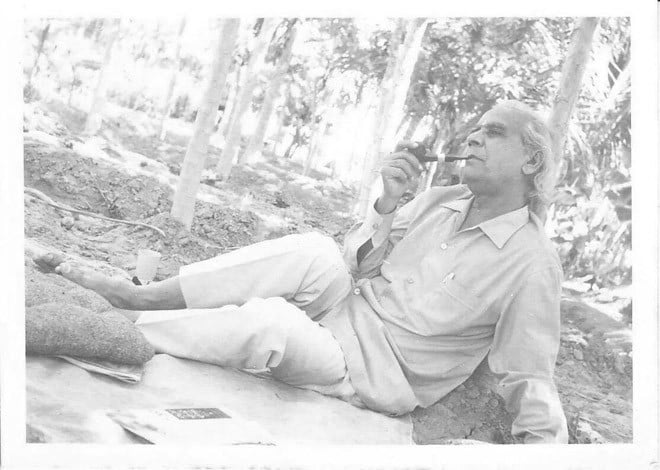
A towering icon of non-conformism in a conformist society

Syed Sibte Hasan was born in a town of East UP a hundred years ago. He came from a religious family but, like many intelligent and dynamic young people of his time, he was so attracted to the 1917 Russian Revolution and the Communist Party’s manifesto that he became a communist for life.
When Pakistan came into being, he was in the US where he had gone to study journalism. He started reporting on the UN activities for New Age weekly but his socialist ideas were greatly disliked by the US administration. Thus he was arrested for a few months and was finally deported. Ideally, he should have gone back to India, but on the direction of the Communist Party of India he came to Pakistan and then stayed here for the rest of his life.
A retrogressive ideology was forced upon this country since the time he came here in 1948, something we have not been able to rid ourselves to this day. This is why Pakistan finds itself in a cul de sac -- of fundamentalism and conservatism. Sibte Hasan Sahab was acutely aware of the fact that Pakistan’s younger generation, stuck in a quagmire of conservatism, can be pulled out only by those who follow the progressive tradition.
He took this task upon himself and wrote books like Maazi ke Mazaar, Moosa se Marx tak Naveed-e-Fikr, Inqalab-e-Iran and Pakistan mein Tehzeeb ka Irtaqa which instilled a new life among the youth. His books sold like hot cakes.
It was surprising for many that the young people were reading about secularism, theocracy and clash between conservatism and progressive thought in modern Urdu literature as if it was popular fiction. Thousands of young people in Balochistan, Sindh, Khyber Pakhtunkhwa and Punjab were influenced by his books and started raising questions on controversial issues. During General Yahya Khan’s reign ‘Youm-e-Shaukat-e-Islam’ was observed with much pomp. Here, Islam was being used only as an excuse; actually, it was part of an effort to prolong General Yahya’s rule.
Read also: On the politics of language
Sibte Hasan had the courage to write on sensitive subjects like secularism and theocracy that brought thousands close to his point of view. In an essay on Allama Niaz Fatehpuri, he writes:
"Mullahism does not belong to a specific country or religion; it is rather a universal mental state, a way of thinking and action which does not follow reason and argument based on logic -- it tries to coax people to accept their beliefs by instilling fear. It injects a poison of fear in the hearts of simple folk, pushes them to obey and serve. It asks people to accept without questioning what scholars and theologians wrote hundreds of years ago, even when what they say betrays reason. It is characterised by arrogance and callousness. It is devoid of emotions such as love and empathy. It hurls abuses on those who trip instead of giving them a shoulder to lean on and slams fatwas of kufr and heresy on those who have lost their way, shutting all doors of betterment and redemption on them."
In a hypocritical society like ours, Sibte Hasan reminds us that those who raise their voice against dictators and autocratic rulers are remembered in history. He writes:
"In every conformist society, there have been people who refused to call evil good and were punished for it. Socrates had to drink poison for saying No. Christ was crucified, Abu Zar Ghaffari died a painful death in Najd desert, Imam Hussain was martyred, Imam Abu Hanifa was imprisoned for 12 years until his death, Bruno was burnt on the stake, Thomas Moor was killed, Sarmad was beheaded, Tahira Quratul Ain -- an emblem of beauty and faithfulness -- was killed, Karl Marx was expelled from his country and lived in abject poverty, Sardar Bhagat Singh was hanged, Julius Fochek and Gabriel Peri were murdered, Hassan Nasir was tortured to death at the Lahore Fort, Chilean president Allende sacrificed his life on democratic principles. But these lucky persons earned eternal fame."
A towering icon in our midst, Sibte Hasan had the courage to celebrate the golden jubilee of Progressive Writers’ Association with such fanfare that stunned both his friends and foes. Remember it was the peak of Gen. Zia’s brutal dictatorship and people were scared of annoying him. In such times, Sibte Sahab gathered people who had the courage to speak the truth. He made preparations for the golden jubilee with courage and perseverance and made it successful.
At that time, we, who were around him, had no idea how drained he actually was. A few months later, he attended the Progressive Writers’ Association’s congregation in Lucknow, went to Delhi from where he had to go to Agra, but he suffered a heart failure in Delhi and could not proceed. Diplomatic decorum required his coffin to be sent to the Pakistan Embassy first and funeral prayers offered. His coffin kept waiting for the ambassador, while the prayer kept getting delayed. It was such a heart-rending scene that I couldn’t control my tears then. Even now, when I think of it, my eyes well up.
The article has been translated from Urdu to English by Saadia Salahuddin.